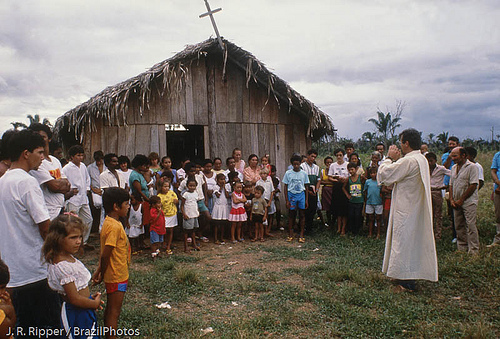One of the less-often reflected on parts of Pope Francis’ apostolic exhortation “Amoris Laetitia“ is the prayer to the Holy Family that concludes the entire letter. This is a great pity, for the prayer is very beautiful – but moreover, highlights the ways we, in the midst of our own families, might strive to follow the Holy Family in our Christian life together.
Jesus, Mary and Joseph,
Amoris Laetitia Paragraph 325
in you we contemplate
the splendour of true love; to you we turn with trust.
We have a hint of the Holy Family’s true love in today’s Gospel. Following Jewish law, Joseph and Mary present their son in the temple along with an offering of two turtledoves. When the Family arrives at the temple, they encounter two people unrelated to them: Simeon and Anna, both elderly, and both who, like the whole People of God waiting in Advent, have waited for years for the moment they might encounter the Christ. Both Simeon and Anna prophesy about how Jesus will be Israel’s redemption.
If I am honest and consider myself in this kind of a moment, I would not maintain the kind of openness t or a prayerful attitude. I think of bringing my newborn baby to the church for baptism, followed by my family, and looking forward to the celebration that will ensues. I am not entirely sure that if two elderly unrelated people had stopped me before any of my kids’ baptisms – let alone took the baby in their arms to hold – that I would have been open to hearing their message. At best I might have tried to shrug off their attention; at worst I might have cried out against their audacity at trying to horn in on the blessed event.
Holy Family of Nazareth,
Prayer continued, Amoris Laetitia 325.
grant that our families too
may be places of communion and prayer, authentic schools of the Gospel
and small domestic churches.
Yet calling out the difference between my response (and what I suspect many people might do as well) is, of course, the point: the Holy Family’s love is true love precisely because it is not only directed inward but it is directed outward, toward others – and not just toward others who “need” them in some kind of charity-based way. They are directed toward others who might have something good to witness about the Gospel. They, and I – we need each other, as we week to be holy families, too. If my family is going to be an authentic school of the Gospel, I too must look outward.
Holy Family of Nazareth,
Prayer continued, Amoris Laetitia 325
may families never again experience violence, rejection and division;
may all who have been hurt or scandalized find ready comfort and healing.
In this era of the pandemic, it is important as well to focus on the fact that the Holy Family shows love to Anna and Simeon, who are elderly. Surely this is one of the key experiences of “violence” and “rejection” these days – (along with the rejection of people with disabilities). Ageism has been an aspect of the pandemic, fueled by the sense that perhaps older people are at the end of their lives, perhaps no longer have much good to share. Anna and Simeon – and countless others today – give lie to that sentiment. Rather, as the pope notes: “We must reawaken the collective sense of gratitude, of appreciation, of hospitality, which makes the elderly feel like a living part of the community.” (AL 191). More: “A family that fails to respect and cherish its grandparents, who are its living memory, is already in decline, whereas a family that remembers has a future.” (AL 193)
The fact that we need each other – young and old – is also described in today’s first scripture reading from Sirach. The reading begins with a description of a younger father and mother in the throes of child rearing. But the passage ends with a description of caring for the elderly. Sirach says: “My son, take care of your father when he is old; grieve him not as long as he lives. Even if his mind fail, be considerate of him; revile him not all the days of his life; kindness to a father will not be forgotten, firmly planted against the debt of your sins —a house raised in justice to you.” The scriptures remind us that to live in a family is not a static event. Families change and grow – but all along we have the responsibility to be “the house raised in justice.”
Holy Family of Nazareth,
Continued prayer, Amoris Laetitia 325
make us once more mindful
of the sacredness and inviolability of the family, and its beauty in God’s plan.
The Gospel suggests that being part of God’s plan is both in following God’s law as well as being open to the fact that life gives us new encounters with God (as with Anna and Simeon) each day. The epistle reading from Paul’s letter to the Colossians describes multiple ways in which Christians might follow God’s law: “Put on, as God’s chosen ones, holy and beloved,
heartfelt compassion, kindness, humility, gentleness, and patience,
bearing with one another and forgiving one another, if one has a grievance against another; as the Lord has forgiven you, so must you also do. And over all these put on love, that is, the bond of perfection.”
To be able do compassion, kindness, humility, gentleness, patience, forgiveness, and love…. Well, that requires that we pay attention to each moment, to the new encounters and surprises God might be throwing our way, each day. We cannot be compassionate if we still think of our eleven-year old children as 3-year olds, or if we ignore the random stranger we meet, or if we still think of our elderly parents as their young selves.
Jesus, Mary and Joseph, Graciously hear our prayer.
Conclusion of prayer, Amoris Laetitia paragraph 325
Amen.





